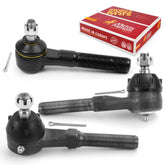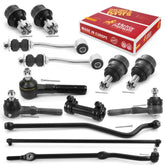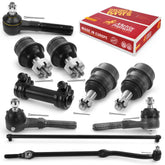Why Do Brake Rotors Warp?
Brake rotors, also known as brake discs, play a crucial role in a vehicle's braking system. They are circular metal discs that attach to the wheel hub and work together with brake pads to effectively slow down or stop a vehicle. When you apply the brakes, the brake pads press against the rotating brake rotors, creating friction that converts kinetic energy into heat and slows down the vehicle. It's important to note that warped brake rotors can lead to uneven braking, vibration, and reduced braking performance. There are several factors that can contribute to the warping of brake rotors.
- Heat Buildup: One of the primary causes of warped brake rotors is excessive heat buildup during braking. When you apply the brakes, friction between the brake pads and rotors generates heat. Repeated and aggressive braking, such as heavy braking during downhill descents, can cause the rotors to heat up unevenly and potentially warp.
- Cooling Insufficiency: Proper cooling is essential for dissipating the heat generated during braking. Vented rotors have fins or vanes between the braking surfaces to aid in heat dissipation. If the cooling system is compromised due to poor ventilation, dust accumulation, or blocked cooling passages, the rotors may not cool down properly, leading to warping.
- Brake Pad Material: Low-quality or improperly matched brake pad materials can contribute to uneven braking and rotor warping. If brake pads are too abrasive or generate excessive heat, they can cause uneven wear on the rotor surface and lead to warping over time.
- Improper Torqueing: Incorrectly torqued lug nuts can lead to uneven pressure on the rotor when the wheel is mounted. This can cause the rotor to become distorted and lead to warping.
- Sudden Cooling: After driving with hot brake rotors, suddenly exposing them to cold water or extreme temperatures can cause thermal shock. This rapid change in temperature can lead to warping.
- Overheating: If the braking system is pushed to its limits consistently, such as during track racing or aggressive driving, the excessive heat generated can cause the rotors to warp.
- Manufacturing Defects: In some cases, manufacturing defects or poor quality control during the production of the brake rotors can lead to uneven surfaces that are more prone to warping.
- Uneven Pad Deposits: In some instances, if brake pads are not bedded properly (a process that helps transfer a thin, even layer of material onto the rotor), uneven pad deposits can form on the rotor surface. These deposits can lead to uneven braking and rotor warping.
It's important to keep an eye out for any signs of uneven braking, vibration, or other issues with your vehicle's braking performance. Not only can these problems be dangerous, but they can also cause further damage to your vehicle if left unaddressed. That's why it's crucial to have your brakes inspected by a qualified mechanic as soon as possible. And now, with Metrix Premium Chassis Parts offering brakes in their listings starting from September 2023, you can rest assured that you'll be able to find high-quality brake parts at a great price.









